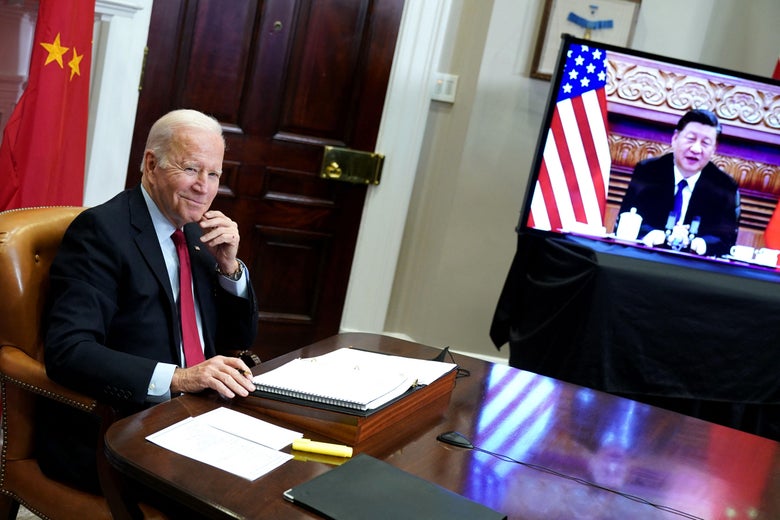FRED KAPLAN

The outcome of the Biden-Xi summit wasn’t exactly the stuff of banner headlines, but it was more significant—potentially even pathbreaking—than the shrugs of many pundits indicated.
Back in June, Joe Biden outlined three reasons for holding a meeting with another world leader, Vladimir Putin, despite the dim chances of producing major results. First, he had long felt there was “no substitute for face-to-face dialogue among leaders.” Second, he and Putin, as possessors of vast nuclear arsenals, shared “a unique responsibility” to maintain “stable and predictable” relations. Third, “we should be able to cooperate when it’s in our mutual interests,” while minimizing the chance of conflict when our interests differ.
At a briefing Tuesday morning, National Security Adviser Jake Sullivan gave a nearly identical explanation for Biden’s virtual conversation with Xi Jingping on Monday night—though he noted America and China’s role as the two largest economic powers, rather than their nuclear arsenals, as the source of their obligation to stabilize relations.
Biden entered the White House with U.S.-China relations as grim as they have been since China emerged as a global power—and, for the first few months of his term, they got worse. A trade war, left over from the Trump years, is still simmering. The two sides’ military leaders no longer meet routinely. Top U.S. officers openly predict war over Taiwan. And the one previous in-person meeting of top diplomats—Secretary of State Antony Blinken’s summit in Anchorage with his Beijing counterpart near the start of Biden’s term—degenerated into a shouting match.
In this sense, while the meeting itself did not produce much, the fact that the Biden-Xi summit on Monday came off as a normal, cordial, and businesslike session of diplomacy—which lasted more than three hours, a bit longer than expected—should be seen as a triumph, even if a modest one.
More tangible goods came out of the summit with Putin, not least the restoration of a longstanding U.S.-Russian dialogue on “strategic stability.” That meeting was also preceded by an extension of the Obama-era New START strategic-arms reduction treaty, which was about to expire. Nothing like that is ready to be signed with China. As Sullivan said at today’s briefing, Biden and Xi discussed “the need for a strategic-stability set of conversations,” but this is “not the same” as the formal dialogue that Washington and Moscow have been having on the subject for many years.
Still, Sullivan said the two leaders held frank, at times “incredibly candid,” talks on every issue facing them, with a mutually clear aim of starting or resuming high-level negotiations on “tangible issues, one by one, to see where we can make progress”—and, where no progress can be made, staying in touch with each other to minimize the chance that disagreements escalate to conflict. He added that the key to discussions in the future—whether by the leaders or their senior diplomats—will be figuring out “how to manage differences.” This may seem banal, but at the moment, there is no forum or set of procedures for managing differences, so the fact that they recognize the need to create such a thing might mean the difference between war and peace in the future.
Biden has long placed great, perhaps excessive emphasis on personal relationships in international politics. But his relationship with Xi in particular has deep roots. When Biden was vice president and Xi was a rising figure in the Chinese Communist Party, the two talked in person or over the phone for hundreds of hours. At the start of Monday’s discussion, Xi referred to Biden as his “old friend”—a signal that was heard not only by the White House but by his own apparatchiks in Beijing.
“There are lots of indicators that both leaders want to back off from the brink,” Daniel Sneider, a lecturer in East Asian affairs at Stanford University, told me on Tuesday. “They both face serious political and economic problems domestically. They’ve both used their rivalry as a way of deflecting attention from these problems. At the same time, they’re both aware that this can lead to the real danger of being dragged into a conflict, which would make their problems much worse.”
Along those lines, Sullivan made several references in his briefing to the danger of war triggered by “miscommunication or miscalculation.”
Sullivan also reiterated a theme that he and Biden have both stressed in several speeches—the interrelationship between domestic and foreign policy. Biden has in the past talked about a “foreign policy for the middle class”—meaning, for instance, trade policies that don’t put American workers or industries at a disadvantage. Biden has sold his two main economic packages—especially the $1 trillion infrastructure bill—as vital to winning the global competition with China: first, as a way to shore up American prosperity, so that we’re no longer so dependent on Chinese exports; second, to show the world that a democratic government can get things done.
Now that Congress has passed the bill, Biden may feel safe in pivoting to a less rhetorically fraught China policy, while remaining fully aware of the convergences and divergences in the two countries’ interests. The summit with Xi was not a blockbuster, but it may mark the start of the pivot.
No comments:
Post a Comment